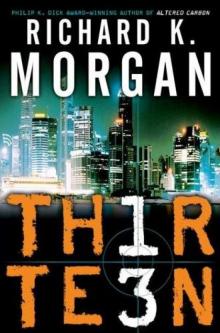- Home
- Richard K. Morgan
Black Man / Thirteen Page 31
Black Man / Thirteen Read online
Page 31
“I won the lottery.”
“Oh, that’s right, I forgot. It’s so much fun on Mars that the grunts buy a ticket every month to see if they can’t get the fuck out of there and home again.”
Carl shrugged. “I didn’t say it was paradise. It was an option.”
“Look, man. You came back, and the reason you came back is that life on Mars is a pile of shit.” Nevant blew more smoke at him. “Some of us just didn’t need to make the trip to work that one out.”
“You were busy making plans to spend the rest of your life up on the altiplano when I caught up with you. That’s just Mars with higher gravity.”
Nevant smiled thinly. “So you say.”
“Why should I lie?”
Outside, streetlights were glimmering to life along the seawall walkway. Sevgi Ertekin sat with Battal Yavuz on tall stools at a salep stall a dozen meters down the promenade. They sipped their drinks in cupped hands and were apparently getting along okay. Nevant tipped his head in their direction.
“Who is she, then?”
“No, I’m not his partner.” Sevgi struggled to keep the edge out of her voice. “This is strictly a temporary thing.”
“Okay, sorry. My mistake. Just the two of you seem, you know…”
“Seem what?”
Yavuz shrugged. “Connected, I guess. That’s unusual with Marsalis. Even for a thirteen, he’s pretty locked up. And it’s not like it’s easy getting close to these guys in the first place.”
“Tell me about it.”
“Yeah. I don’t want to sound like those Human Purity fuckwits, but I’ve been working the tract for nearly a decade now, and I’ve got to say variant thirteen are the closest thing to an alien race you’re ever going to see.”
“I’ve heard the same thing said about women.”
“By men, yeah.” Yavuz slurped at his salep and came up grinning. He cut a cheery figure in the evening gloom and the yellowish lights from the stall. His jacket collar framed a tanned, well-fed face, and there was a small but unapologetic paunch under his sweater. Life at UNGLA Eurozone seemed to be treating him well. His hair was academic untidy, his eyes merry with reflected light. “Naturally. The way you people are wired, compared with the way we are.”
“You people?”
“I’m joking, of course. But the same way male and female genetic wiring is substantially different”—Yavuz jerked a casual thumb back toward the lit interior of the restaurant, and the two men who sat facing each other in the window—“that’s the way those two are substantially different from you and me both.”
“Bit closer to you people, though,” said Sevgi sourly. “Right?”
Yavuz chuckled. “Fair point. In testosterone chemistry, in readiness for violent acts and suspension of basic empathy, yes, I suppose so. They are more male than female, of course. But then, no one ever tried to build a female thirteen.”
“That we know of.”
“That we know of,” he echoed, and sighed. “From what I understand, readiness for violent acts and suspension of empathy were exactly the traits the researchers hoped to amplify. Small surprise they opted for the male model, then.”
For just a moment, his gaze drifted out past her shoulder to the sea.
“At times,” he said quietly, “it shames me to be male.”
Sevgi shifted uncomfortably on her stool. She turned her salep mug in both hands. They were speaking Turkish, hers a little creaky with lack of use, and for some reason, some association maybe with childhood misbehavior and scolding, the Turkish phrasing of that sentiment—it shames me—lent an obscure force to Yavuz’s words. She felt her cheeks warm against the cold air in sympathy.
“I mean,” he continued, still not looking at her. “We index how civilized a nation is by the level of female participation it enjoys. We fear those societies where women are still not empowered, and with good cause. Investigating violent crime, we assume, correctly, that the perpetrator will most likely be male. We use male social dominance as a predictor of trouble, and of suffering, because when all is said and done males are the problem.”
Sevgi’s eyes flickered away to the restaurant window. Stefan Nevant was leaned across the table, gesturing, talking intently. Marsalis looked back at him, impassive, arms draped on the back of his chair, head tilted slightly to one side. The same intensity seemed to crackle off both men for all the differences in their demeanor. The same raw sense of force. It was hard to imagine either of them ever talking about a sense of shame. For anything.
Deep in the pit of her stomach, despite herself, something warmed and slid. She felt her cheeks flush again, harder. She cleared her throat.
“I think there’s another way to look at it,” she said quickly. “Back in New York, I’ve got a friend, Meltem, who’s an imam. She says it’s a question of stages in social evolution. You’re Muslim, right?”
Yavuz put tongue in cheek, grinned. “Nominally.”
“Well, Meltem says—she’s Turkish, too, Turkish American, I mean, and she’s a believer, of course, but—”
“Yeah,” Yavuz drawled. “Comes with the job, I imagine.”
She laughed. “Right. But she’s a feminist Sufi. She studied with Nazli Valipour in Ahvaz before the crackdown. You’ve heard of the Rabia school?”
The man in front of her nodded. “Read about them. That’s the Ibn Idris thing, right? Questions all authorities subsequent to the Prophet.”
“Well, Valipour cites Idris, yeah, but really she’s tracing a line right back to Rabia al-Basri herself, and she’s arguing that Rabia’s interpretation of religious duty purely as religious love is uh, is you know, the prototypical feminist understanding of Islam.”
And then she dried up, suddenly self-conscious. Back in New York, she wasn’t used to talking about this stuff. She was rarely at the mosque these days, never found the time for it. Her conversations with Meltem had stopped soon after Ethan died. She was too angry, with a God she wasn’t at all sure she believed in anymore, and in his echoing absence with anybody who made the mistake of taking his side.
But Battal Yavuz just smiled and sipped at his salep.
“All right, that sounds like an interesting angle,” he said. “So how does your imam square her Islamic feminism with all that inconvenient textual shit in the hadiths and the Book?”
Sevgi frowned, mustering her rusty Turkish. “Well, it’s cycles, you know. The way it looks from the historical context, the male cycle of civilization had to come first, because there was no other way outside of male force to create a civilization in the first place. To have law and art and science, you have to have settled agrarian societies and a nonlaboring class that can develop that stuff. But that kind of society would have to be enforced, and pretty brutally in the terms we look at things today.”
“That’s right.” Yavuz nodded at the two thirteens in the restaurant window. “You’d have to wipe out all those guys, for a start.”
“She’s the client.” Carl picked up a fork and helped himself to a slice of eggplant from the meze tray. “Are we going to eat some of this?”
Deep, final draw on the cigarette, raised brow. Nevant stubbed out the butt. “You freelancing now?”
“I always was, Stefan. UNGLA hold the license, but they only call me when they need me. Rest of the time, I’ve got to make a living like everybody else.”
“So what does the client want with me?”
“We’re chasing some familia andina connections. Trying to bust a Marstech ring in the induction camps.”
“There’s some reason that I’d help you do that?”
“Apart from the fact that Manco Bambarén sold you out to me three years back? No, no reason I can think of. I always did have you down as the forgiving sort.”
Nevant skinned a brief grin. “Yeah, tayta Manco sold me out. But it was you that came to collect.”
“Blame the messenger, huh?”
“Oh, I do.”
Carl helped himself to more meze. “You
really think a cut-rate godfather with delusions of ethnicity was ever going to go up against UNGLA for you? Were you really that desperate to believe you’d found a bolt-hole, Stefan? There’s a reason Manco made it to tayta level, and it’s not his charitable nature.”
“What the fuck do you know about it, Mars man? As I recall, you were on urban fucking pacification detail most of your time in the Middle East.”
“I know tha—”
“Do you know that they’ve got warlord alliances operating in Central Asia still that I fucking built from nothing back in ’87? Do you know how many of those puppet presidents you see mouthing the words on Al Jazeera I helped launch?”
Carl shrugged. “Works in Central Asia doesn’t mean it’ll fly in South America. That’s a whole different continent, Stefan.”
“Yeah, and a whole different goal.” Nevant shook a new cigarette out of the packet. He fit it in the corner of his mouth, drew it to life, and raised his eyebrows. “You want one of these?”
“I’m eating.”
“Suit yourself.” He leaned forward, blew smoke across the table, and grinned. “See, the familias aren’t like those warlord motherfucks, they never were. Warlord wants the same thing any cudlip politician wants—legitimacy, recognition, and respect from the rest of the herd. The whole nine-car motorcade.”
Carl nodded, chewing. He’d had pretty much the same lecture from Nevant three years ago, waiting for the paperwork to clear so he could take the Frenchman out of Lima in restraints. But let Nevant lecture. It was Carl’s best chance of gleaning something he could use.
“So habitually, you’ve got a lawless vacuum and a bunch of these assholes fighting to put their stamp on a new order that lets them ride up front in the lead limo. Now, with the familias, that’s never going to be the case. There’s already a structure in place, and it’s already full of legitimized scumbags, criollo whites, and trained token indigenas who’ve got the parliament, the military, the banks, the landowners, all that good shit right there in their pockets. The familias are locked out, all they’ve got is crime and this faint echo of an ethnic grievance.” Nevant cupped a hand at his ear. “And the echo’s fading, man. COLIN’s shipped so many altiplano natives out to Mars over the past fifty years, poured so much money into the region, the familias just can’t recruit like they used to. Only places they’re strong anymore are ghetto populations in the Republic. No one else can be bothered. Nobody’s scared of them anymore.”
“So you were going to provide the fear.”
More smoke, billowing. Nevant gestured through it. “Play to your strengths. Everybody’s scared of the thirteens.”
“Yeah, would be, if they weren’t all locked up.”
The Frenchman grinned. “You wish.”
“Oh come on.” Carl waved the fork. “We’ve got a couple of dozen out there at any one time, at most.”
“Not the point, Mars man. Not the point at all.”
“No? Then what is the point?”
Nevant toyed with the cutlery on his side of the table, just touching it with the fingertips of his right hand. “The point is that we exist. We’re a perfect fit for all those atavistic fears they have. They’ve been desperately looking for witches and monsters ever since they wiped us out the first time around. Now they’ve got us back.”
“Okay, so male force and hierarchy nail the human race into a coherent social order, weed out the worst of the loose cannons, and provide a stable base, all so that thousands of years later female principles can emerge to govern with a modicum of civilized decency. That’s your imam’s stance?”
Sevgi nodded. “It’s Valipour’s stance as well, give or take. And a valid Sufistance, too, insofar as it represents a continuing revelation.”
“Sort of explains the backlash, though, doesn’t it.” Yavuz grinned. “Thanks, guys, you’ve done a bang-up job, given your gender limitations, but we’ll take it from here. I mean, it’s hard to imagine the shahuda sitting still for that.”
“Well.” She shrugged. “They didn’t, no.”
“Yeah, I remember the mobs here, chanting in the streets when I was a kid.” Yavuz put a raised, droning note into his voice. “Men have authority over women because Allah hath made the one of them to excel the other. So forth.”
Sevgi snorted. “That tired old shit.”
“That tired old shit’s the Qu’ran, as I recall. Is the Qu’ran not a part of Islam in New York?”
“Very funny. Is historical context not a part of intelligent human thought around here?”
The impish grin again. Yavuz seemed to be shrugging off his sudden bout of male guilt. “Around here, sure. But you don’t have to go too far southeast before intelligent human thought is pretty severely frowned on. Come to that, from what I hear you don’t have to go too far southwest of New York before the same thing applies.”
She laughed. “Fair comment. Marsalis told me you wrote a thesis on that stuff. Similarities in the US before Secession and Turkey, something like that?”
“‘Psychosocial Parallels in Turkish and American Nationalisms,’” Yavuz quoted with mock-bombast. He gestured modestly, undercut the effect. “Nothing’s ever that simple, of course, but there were a lot of similarities. Both big, stroppy nationalisms founded in very shallow cultural soil. Both constitutionally secular societies with a resentful fundamentalism snapping at their heels. Both running a massive cultural gap between urban and rural society. Both very uneasy with the New Math, both trying to beat back the virilicide with draconian drug laws and wishful thinking. You know this place might have fractured apart, too, the way the US did, if we hadn’t had the Europeans sneaking about pulling levers from the outside.”
“You don’t sound that pleased about it.”
The Turk sighed. “Yeah, I know. And I should be, I guess. Certainly don’t want the fucking shahuda prowling the streets here, stoning my daughters if they go out unchaperoned or showing more flesh than a wrapped corpse. But it’s no fun, either, knowing your whole country’s just the new backyard for a bunch of over-the-hill ex-imperial cynics.”
“Now you sound almost patriotic.”
“Not me.” He shook his head grimly. “Did Carl tell you I used to teach in the prison system before I got this gig?”
“He mentioned it.”
“Yeah, well you get to see some unpleasant things in the Turkish penal system. I’ve met a few too many torture-scarred political prisoners to be much of a Turkish patriot anymore. The way I see it, anyone who’s proud of their country is either a thug or just hasn’t read enough history yet.”
“I like that.” Sevgi smiled into her salep. “So you think the US might have held together the way Turkey did. I mean, if there’d been an outside force to apply the right pressure?”
“Not necessarily, no.” Yavuz looked unaccountably sad as he said it. “I mean, you’ve got the whole states’ rights issue, which we never had. Two centuries of southern resentment and cultural abrasion, religious fury, racial tension. Those are pretty deep fissures. Plus the anti-drug laws meant less chance for the virilicide to do its weeding out the way it was elsewhere.”
He put his salep mug down on the counter, sat back, and held his open palms toward it, as if in obscure invocation.
“But anyway, it’s academic, isn’t it. Because there never was an outside force big enough to make you people behave. COLIN didn’t exist as such back then, the UN was still a toothless tiger trying to find its dentures, the Chinese just didn’t give a shit. Homegrown corporate interests were all behaving like thugs, they just wanted the cheap resources and labor for as long as it lasted. You’ve got the environmental lobby screaming, Zhang fever scaring the shit out of the Asian populace. Pacific Rim commercial interests don’t want a fight, they just step in and make their offer, and pretty much everyone on the West Coast breathes a big sigh of relief when they do. Los Angeles goes first, toe in the pool, and then the whole coast takes the plunge when it works.”
Sevgi nodded. Somewh
ere in a box on top of a wardrobe, she still had a replica scroll of the Angeline Freeport charter. Murat had brought it back from a West Coast medical conference for her when she was still in junior high. Like most successful first-generation immigrants, he’d been passionate about his adoptive homeland, even after it fractured apart under his feet almost as he stepped off the plane.
“Yeah,” she said grayly. “And anything the fucking West Coast can do…”
Yavuz nodded, teacher-like. “Just so. The northeastern states seize the precedent and walk away as well. And on all sides, the rhetoric has been stoked so high that there can be no climb-down for anyone. It’s the classic male impasse. Honor satisfied, and everybody loses. A textbook case. Have you ever read Mariela Groombridge? Evolving States?”
She shook her head.
“You should. She’s brilliant. Taught at the University of Texas until they threw her out for signing an anti-creationist petition. She’s in Vienna these days. Basically, she argues that the Secession was an example of a nation-state going extinct because it failed to adapt. America couldn’t cope with modernity, it died from the shock and was torn apart by more adaptive entities. Though I think she tends to skate around the edge of what America really died of.”
“Which is what?”
Yavuz shrugged. “Fear.”
“It’s a power beyond numbers.” Nevant still hadn’t touched the meze, but he was a couple of fingers down the raki glass now. He sneered. “You think the cudlips give a shit about facts? Statistics and formal studies? It’s the knee-jerk, man. That’s what these people live and breathe. There are monsters, there is evil, and it’s somewhere out there in the dark. Whoo-oo-oo. You know, before I got out to Peru, Manco was putting out a rumor that he had pistacos working for him. Settling scores for that turf squabble they had back in ’03.”
Carl nodded. On Mars, he’d seen the familias run a similar dynamic among the less educated end of the Uplands Initiative workforce. He’d been offered pistaco work himself a couple of times, lack of pale skin notwithstanding.

 Woken Furies
Woken Furies Altered Carbon
Altered Carbon Broken Angels
Broken Angels Thirteen
Thirteen The Cold Commands
The Cold Commands The Steel Remains lffh-1
The Steel Remains lffh-1 Market Forces
Market Forces Altered Carbon tk-1
Altered Carbon tk-1 Woken Furies tk-3
Woken Furies tk-3 The Dark Defiles
The Dark Defiles Black Man / Thirteen
Black Man / Thirteen Broken Angels tk-2
Broken Angels tk-2